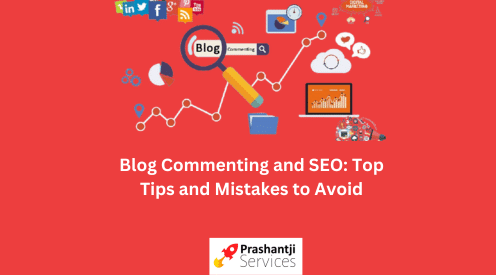Welcome to the digital age where every click and comment holds the potential to boost your site’s visibility. At Prashantji Services, a leading Digital Marketing Agency in Delhi, we understand the intricate dance of SEO and its components. Today, we’re diving deep into an often-overlooked aspect of SEO—blog commenting. This guide is not just about what blog commenting is, but how you can use it to forge connections, enhance visibility, and improve your site’s SEO in a meaningful way. Let’s explore how strategic blog commenting can become a game changer in your digital marketing strategy.
Understanding Blog Commenting in SEO

Blog commenting is a strategic SEO tool that boosts visibility and fosters community engagement. By commenting thoughtfully on relevant blogs, you can enhance your site’s backlink profile and drive traffic. Effective blog commenting involves adding value through insightful comments, using keywords like blog comments SEO naturally, and maintaining a consistent presence. Avoid generic remarks and keyword stuffing to keep your contributions valuable and engaging. Done right, blog commenting not only improves your SEO but also establishes you as an active participant in your industry, enhancing your overall digital marketing strategy.
The Importance of Blog Commenting
The importance of blog commenting cannot be overstated in the realm of digital marketing. It’s a simple yet powerful tool that can significantly influence your website’s SEO, increase engagement, and build community. Understanding and leveraging blog commenting effectively can lead to numerous benefits for both bloggers and their readers.
- Enhances Engagement: Encourages interactions on both your blog and others, keeping content dynamic and readers involved.
- Builds Relationships: Helps establish connections with bloggers and readers, which can be beneficial for networking and collaboration.
- Increases Visibility: Regular comments increase your exposure in your industry, helping you gain recognition and attract new followers.
- Improves SEO: Comments can provide backlinks to your site (if allowed), which are valuable for SEO, helping improve your site’s ranking on search engines.
- Drives Traffic: Insightful comments can intrigue readers and motivate them to visit your website, leading to increased web traffic.
- Feedback Mechanism: Comment sections can serve as immediate feedback channels, helping you understand what resonates with your audience.
How to Effectively Use Blog Comments for SEO
Blog commenting can be a highly effective tool in digital marketing strategies, particularly for SEO and networking purposes. However, to harness its full potential, you need to approach it with a thoughtful and strategic plan. Here are some effective techniques for blog commenting that can help you maximize its benefits:
1. Choose Relevant Blogs
Select blogs that are suitable to your industry. Commenting on relevant blogs not only ensures that your comments reach an interested audience but also increases the likelihood that backlinks from these blogs will be more valuable. Targeting blogs with a good reputation and high traffic can also amplify your visibility.
2. Read the Post Thoroughly
Before you comment, make sure you fully understand the blog post. This will help you write meaningful and relevant comments that contribute to the discussion. Insightful comments that reflect a deep understanding of the content can establish your credibility and encourage others to engage with your comment.
3. Add Value
Your comments should provide additional value to the conversation. This could be in the form of insights, a personal experience, an answer to a question posed in the blog, or even a thoughtful question that furthers discussion. Avoid using responses like “Nice blog”, since they are frequently disregarded and don’t add anything to the discussion.
4. Use Keywords Wisely
Incorporate relevant keywords into your comments naturally. This can help improve the SEO of your comment and increase the chances of visibility through search engines. However, avoid keyword stuffing as it can make your comments look spammy and may lead to them being deleted or ignored.
5. Include a Link When Appropriate
Some blogs allow you to include a link in your comment or name. Use this feature judiciously. Include a link if it adds value to the comment, such as directing readers to a relevant article or resource on your website. However, excessive linking or linking to irrelevant pages can be seen as spam.
6. Comment Regularly
Consistency is key in blog commenting. Regularly commenting on various blogs can help you build a presence in your industry. This regular interaction is essential for networking and establishing yourself as an active member of your community.
7. Monitor Your Results
Keep track of the blogs you’ve commented on and monitor the traffic or engagements that result from those comments. This can help you refine your commenting strategy over time and focus on interactions that provide the most benefit.
Advanced Tips for Leveraging Blog Commenting
Beyond the basics, consider these advanced strategies to enhance your blog commenting approach:
- Using Google Alerts: Set up alerts for keywords related to your industry to find new blogging opportunities for commenting.
- Profile Optimization: Ensure your commenting profile has a professional avatar and username linked to your site. This increases the credibility of your comments.
- Tracking Comments: Keep track of where and when you comment and monitor any responses or traffic that stems from these comments to refine your strategy.
Common Mistakes to Avoid in Blog Commenting

Engaging in blog commenting can be a powerful tool for SEO, networking, and driving traffic to your site. However, certain common mistakes can not only diminish these benefits but also potentially harm your online reputation. Here’s a look at some key pitfalls to avoid when commenting on blogs:
1. Being Overly Promotional
One of the biggest blunders is using blog comments as a platform for overt self-promotion. Comments that are too salesy, or that straightforwardly promote your products or services, are often not well-received. This kind of approach can make your comments seem spammy, which could lead to them being deleted or ignored.
2. Keyword Stuffing
It’s essential to use keywords like blog comments SEO and digital marketing blog commenting naturally in your comments. Overloading your comments with these keywords makes them seem forced and can be off-putting to both the blog owner and other readers. It’s about finding a balance — the keywords should support the comment, not overwhelm it.
3. Posting Generic Comments
Comments like “Great post!” or “Nice blog!” do not contribute to the conversation and are generally seen as a low-effort attempt to gain visibility. Always aim to make your comments thoughtful and relevant, showing that you’ve engaged with the content.
4. Disregarding Tone and Respect
The tone of your comments should always be respectful and considerate, even if you disagree with the content of the blog post. Aggressive or disrespectful comments can harm your reputation and lead to negative interactions with other users.
5. Neglecting Your Profile
When your commenting profile lacks a proper username or avatar, it can reduce the credibility of your comments. Ensure your profile on blog comments site list is complete and professional as it represents your brand or personal identity online.
Conculsion
In conclusion, blog commenting is a powerful tool that can significantly enhance the digital marketing efforts of Prashantji Services. By actively participating in the blogosphere through thoughtful and engaging comments, your agency can build valuable relationships, increase its visibility, and drive more traffic to your website. This not only helps in establishing Prashantji Services as a thought leader in the digital marketing realm but also improves your SEO, contributing to better search engine rankings and overall online presence. Thus, incorporating strategic blog commenting into your marketing activities can yield substantial benefits for your brand.








